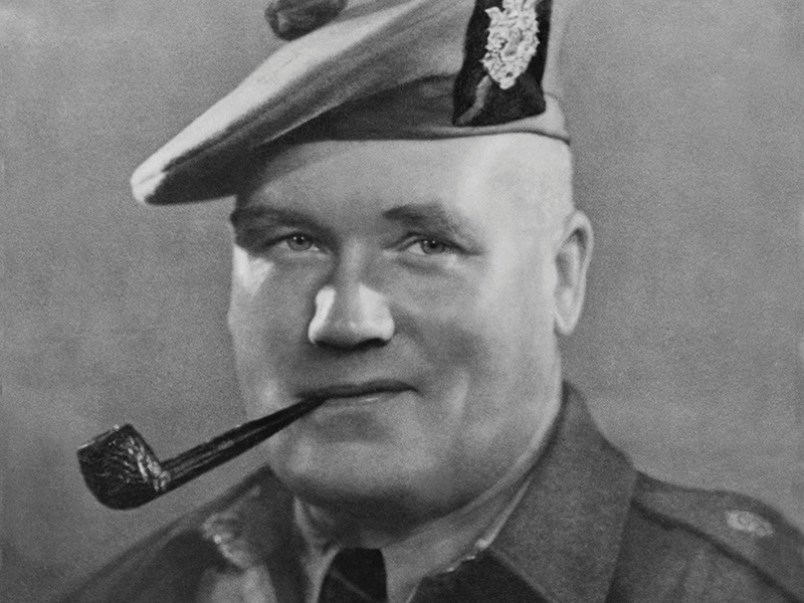Captain John MacGregor VC, Canada’s most decorated war hero, will be honoured on Saturday, September 29 in his birthplace of Scotland. The ceremony takes place in Nairn, exactly 100 years after the start of the battle MacGregor was ultimately awarded a Victoria Cross medal for his valour and leadership.
When it learned of the event, the Royal British Legion Scotland in Nairn planned for a commemorative stone to be housed at the local cenotaph.
“Rather than place it as a paving stone we have arranged for a plinth to be built close to our War Memorial to display the stone properly,” said Nairn legion president, lieutenant colonel (retired) RJ Towns MBE. “We at Nairn Legion think highly of John MacGregor VC and will do our best to honour him properly on the day.”
MacGregor led an extremely eventful life. A carpenter by trade, he emigrated from Scotland to Canada in 1909 at the age of 20, arriving in Montreal and working his way west building railways bridges. In Vancouver, he worked on the construction of the University of British Columbia, before booking passage to Prince Rupert, where he learned trapping and built himself a log cabin on the Nass River.
In 1914, upon learning Britain was at war with Germany, MacGregor travelled some 400 kilometres on snowshoes to enlist. After his strenuous journey, he did not pass the initial physical exams, so he travelled to Vancouver to attempt enlisting again, becoming a private in the 11th Canadian Mounted Rifles. His granddaughter, Jaye Roter, never met him, but she said she has heard many stories from her father, elder brother and uncle. “Some things I learned about my grandfather are he was a very determined, devoted and brave man, who was also proud and humble,” she said.
MacGregor’s feats during the war were amazing. He was awarded the Distinguished Conduct Medal after leading the Canadian attack on Vimy Ridge in 1917. In 1918, he received the Military Cross and Bar, and later the Victoria Cross, for extreme bravery and leadership at Cambrai, France, during the Battle of the Canal du Nord. During some very heavy combat, and despite being wounded himself, he single-handedly put a series of German machine guns out of action and took eight prisoners. He and his company then captured the village of Neuville-Saint-Remy, which was a significant contribution to the wider offensive.
“After World War 1, and marrying my grandmother, Ethel, they decided to settle in Powell River, where he could work in the mill as a carpenter,” said Roter, who now lives in Edmonton. MacGregor never spoke of his wartime achievements and wished to remain anonymous, she said.
“He did not like the publicity of his awards, and kept the fact that he was a war hero as quiet as possible.”
He and Ethel built a home at Cranberry Lake, on what is now known as MacGregor Avenue.
During the hiring squeeze of the 1920s, he refused to pay his bosses a percentage of his pay in exchange for job security, and ended up being let go.
“If it had been known he was a war hero, this would never have happened,” said Roter. “He then found work away from Powell River, but when my grandmother started giving piano lessons to the mill manager’s children, he was hired back.”
In 1929 the Prince of Wales held a dinner for all Victoria Cross recipients in London, England.
“They were looking for John to attend, but he couldn’t be found,” said Roter. “Finally, an old friend located him and told him about the dinner. Knowing this would be the end of his anonymity, he was persuaded to attend to honour his regiment.”
MacGregor was then rushed to New York, where he boarded a ship to Britain and attended the dinner. He served again in World War II from 1940 to 1946, achieving the rank of lieutenant colonel and commanding the 2nd Canadian Scottish Regiment (Princess Mary’s).
When he was discharged from the army, he and his son set up MacGregor Concrete in Cranberry, and Ethel continued to teach piano lessons to many people in Powell River. He loved the outdoors, his community and above all Canada.
“When asked what his greatest award received was, John replied that it was his Canadian citizenship,” said Roter.
For RJ Towns, the legacy of John MacGregor remains a source of pride in his native Scotland as well.
“In September 2012, I visited Powell River to see his home and his final resting place,” said Towns. “We are extremely proud of our part in the story of John MacGregor VC and will do our best to honour him in a deserving manner.”




